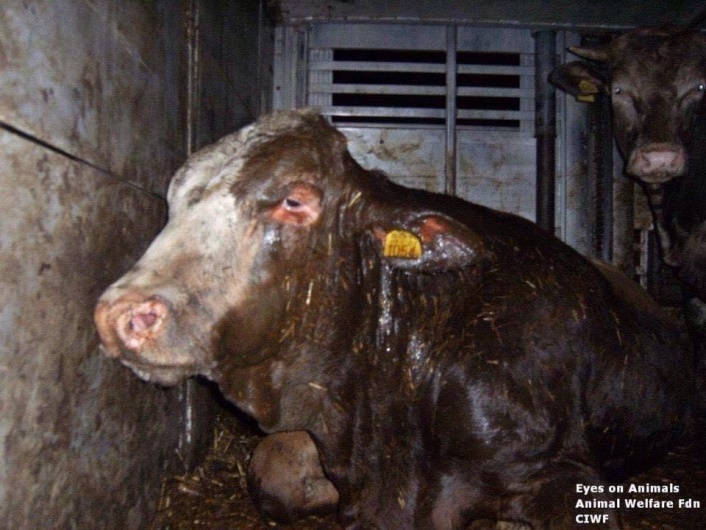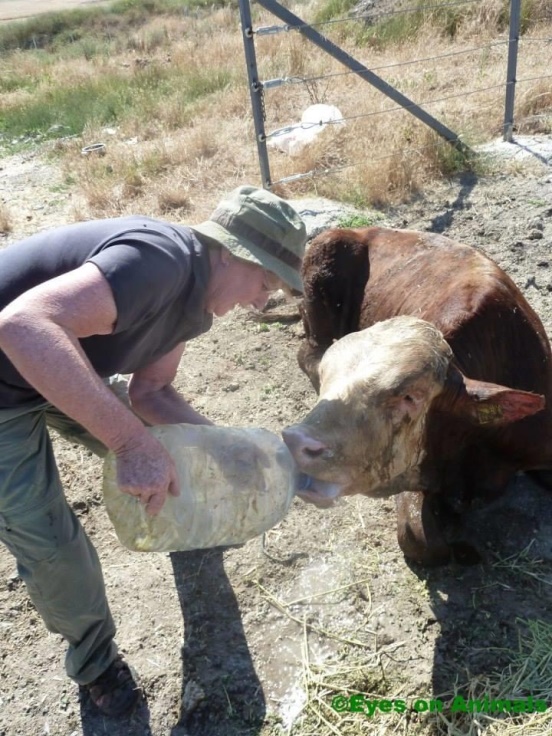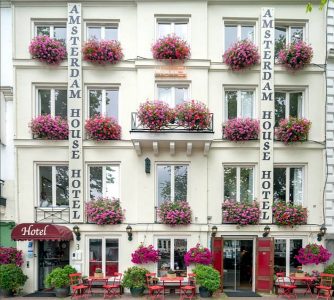The Dutch Ministry of Agriculture, Nature and Food Quality and several Federal States in Germany finally put a stop to the export of animals to third countries requiring a 24-hr stop, but other EU Member States must follow suit.
For years EU animals, such as dairy cows and breeding pigs, slaughter-cattle and sheep, trucked to far away countries outside the EU have been cooped up in trucks for days on end, illegally. Animals from the EU are supposed to be unloaded for 24-hrs to be properly rested, fed and watered after specific maximum times on board, but there is no reliable infrastructure in countries outside the EU to do so. Animals therefore have been remaining on board. This has been going on for years because of lying and cheating by the exporters and transporters who claimed fake resting places in the third countries on their journey logs.
On May 26, 2020 the Dutch Minister of Agriculture, Nature and Food announced that its authorities will no longer approve requests from animal exporters and transporters to truck animals from the Netherlands to third countries requiring a 24hr rest stop. This decision follows the decision made by three Federal States in Germany last year, that also stopped approving such journeys from their areas. But now other EU countries, and the rest of the German Federal States, must follow suit. This decision is long overdue.

EU animals are regularly trucked off to faraway places like Russia (even Siberia), eastern Turkey, Kazakhstan and Uzbekistan. The reason the German Federal States and the national Dutch officials finally stopped approving these journeys is because they collected enough evidence that there was an absence of control posts in these countries. A European Court of Justice Decision (C424/13) in 2015 also helped further their case, as the court decision confirmed that the mandatory 24 hr rest periods were to be respected and enforced during the part of the journey taking place outside the EU territory.
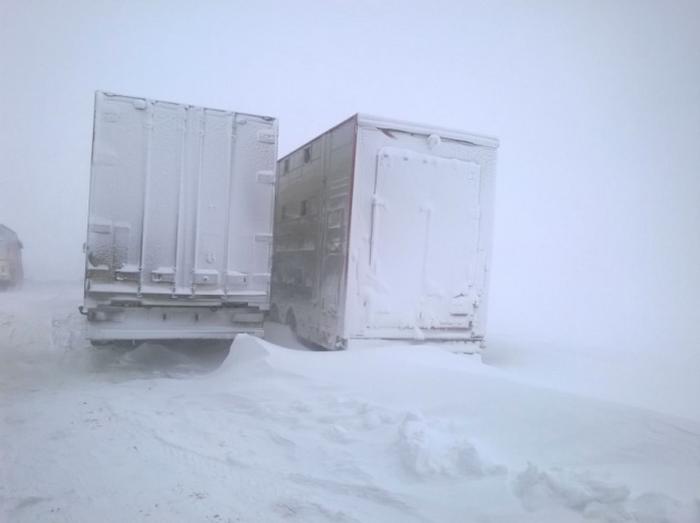
2019: Livestock trucks carrying cattle from Europe in extreme cold conditions in Russia, stuck in the snow with a frozen water system 
2019: Photo of what was found at the fake control post address in Samara, Russia – a bus terminal (Google)
In reality the addresses of so called “resting places” in the third countries, written on the journey logs by animal exporters and transporters, were nothing more than empty parking lots, gas stations, bus stops, border crossings or tiny unhygienic stables without adequate provisions. This serious problem was illustrated already and repeatedly by NGOs such as Animal Welfare Foundation, Tierschutzbund Zürich, Eyes on Animals and Animals’ Angels who, since 2009 trailed trucks transporting animals on some of these long routes and exposed this huge fraud and animal-welfare concern to the EU commission and all Member State Authorities. In August 2019 a group of official veterinarians from Germany drove to some of these so-called resting places on the route to Russia, and also discovered only parking lots, non-operational stables and no infrastructure.
Finally some members of the transport industry themselves started to admit that they never unloaded their animals, claiming the animals were better off in the trucks as unloading them in foreign countries with no official hygiene inspections meant the animals could be exposed to disease. Meanwhile now the Federal Authorities of the Russian Federation stated in a letter from April 2020 to not having any control posts in their country, except for one near their western border with Belarus and the regional authorities of Russia are not providing reliable and consistent information. As well, recent reports from the EU Commissions’s DG Sante also confirm the lack of control posts on these routes. In their report DG(SANTE) 2019-6834 it says: “The main concerns for the welfare of animals relate to the non-EU leg of the journey. The available information indicates that most transporters do not meet applicable EU rules after leaving the Union. The absence of agreements with EU neighbouring countries, together with poor retrospective checks and the inability of Member States to ascertain the conditions of transport and the feasibility of the plan for that part of the journey contribute to that concern.”
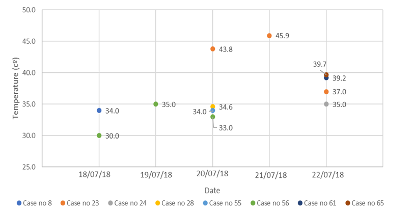
2018: Printouts from temperature measurements inside trucks stuck at the Turkish border (Animal Welfare Foundation) 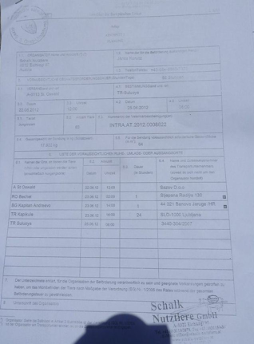
2012: One of hundreds of journey logs claiming a 24-hr rest at fake control post – here it is indicated Kapikule which is just the name of the Turkish side of the EU/Turkey border, an area without any proper facility to unload animals
Additional problems that arise when animals cannot be unloaded for long periods of time, documented repeatedly by NGOs in the field, is that animals suffer tremendously during extreme temperatures.
Trucks full of cattle and pigs heading to Kazakhstan, Uzbekestan and Russia in the winter, even to the far east in Siberia, faced extreme cold and snow, some trucks getting stuck for days in blizzards or heavy snow. Water systems froze, with animals unable to be adequately watered on board.
During the period of December 2018 until March 2019 the major exporting countries such as Germany, The Netherlands and Denmark sent 488 consignments through Russia with destinations as far away as Kazachsthan, Uzbekistan, Turkmenistan, etc. During this period temperatures along the route dropped down to minus 24 degrees Celsius.
Stuck inside the trucks for days on end during the summer hot months to Turkey this lead to extreme heat stress and mortality. Water in the trucks’ drinking system was coming out very hot, undrinkable for the animals. Ammonia on the trucks rose, as did humidity and the swollen bodies of dead animals were often forced to remain on board among the living, and injured animals were unable to be unloaded and treated.
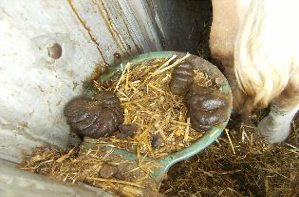
2018: dirty drinking devices on a truck carrying animals from the Czech Republic to eastern Turkey (Source: Eyes on Animals and Animal Welfare Foundation) 
2017: Romanian bull suffering from extreme heat stress and deprivation of water stuck on board for over the EU maximum hours in Turkey (Source: Eyes on Animals, Animal Welfare Foundation)
It is indeed good news that the national Dutch authorities and some of the Federal State authorities finally put their foot down, despite facing major outcry from the industry and their lobby groups. But the good news is coming late, so many animals have already suffered from endless and exhausting journeys, and there are so many animals on these routes still today. If wrong is to be made right, there is no time to lose; all Member States must apply this and stop approving journeys in violation of applicable legislation.
We will renew pressure on the authorities of other countries to do the same and continue exposing these routes, and the exporters and transport companies using them, of the wrong-doing.
To view some of our videos showing the results of keeping animals cooped up in trucks in third countries, visit the following links:
5-year summary of on-going violations taking place on the export route from Europe to Turkey with animals suffering from being cooped up for days, documented by Eyes on animals, AWF|TSB and CIWF.
As of minute 27:50 in this documentary by Manfred Karreman, an inspector from NGO Animals’ Angels and thereafter a ministry representative of the Federal State of Hessen (Germany), Dr. Madelaine Martin, describe their observations on the route to Russia and lack of control posts observations on the route to Russia and lack of control posts to unload animals there.
